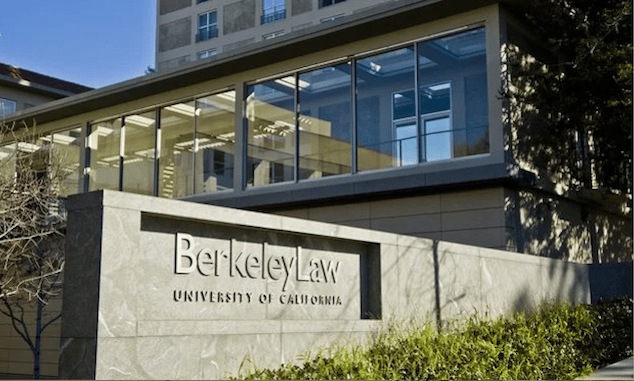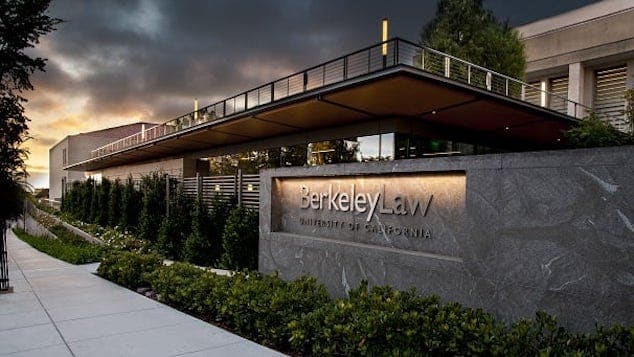
Berkeley Law student groups ban Jewish speakers in adopting bylaw to protect the safety and welfare of Palestinians on campus as measure raises question of discrimination and anti-semitism.
Student organizations at the University of California, Berkeley School of Law are facing backlash even by their own dean after adopting a controversial bylaw that pledges to not invite any Zionist or pro-Israel speaker to give lectures at events.
Written by Berkeley Law Students for Justice in Palestine (LSJP), the bylaw is meant to ensure ‘the safety and welfare of Palestinian students on campus.’ It added that the organization will hold ‘Palestine 101’ training courses.
At least nine groups have adopted the rule so far, including the Berkeley Law Muslim Student Association, Middle Eastern and North African Law Students Association, Womxn of Color Collective, Asian Pacific American Law Students Association, Queer Caucus, Community Defense Project, Women of Berkeley Law and Law Students of African Descent.
Erwin Chemerinsky, the law school’s dean since 2017, identifies as Jewish and recognizes that under this new bylaw he would not be able to speak.
‘It is troubling to broadly exclude a particular viewpoint from being expressed,’ he told The Jewish News of Northern California. ‘Indeed, taken literally, this would mean that I could not be invited to speak because I support the existence of Israel, though I condemn many of its policies.’
Any future lawyer who thinks this is a good precedent should be expelled from law school and never allowed to take the bar. This isn’t simply a misguided notion, it’s dangerous. Where are the adults who will put a stop to this? https://t.co/6k8W5IIANQ
— Ser Elton (@serelton) September 30, 2022
Anti-semitic and discriminatory
Some Jewish organizations have criticized Chemerinsky’s response, indicating he has allowed for an anti-Semitic environment at the school.
Chemerinsky added that students involved ‘are taking a step down a very ugly road.’
‘Berkeley Law wouldn’t be Berkeley Law if students didn’t engage in a certain amount of wrongheaded political nonsense,’ he said.
‘This is different, because it’s not just a political stunt. It is tinged with antisemitism and anti-Israel national origin discrimination.’
The Jewish Students Association at Berkeley Law wrote in response to the byline that they were ‘saddened’ and ‘concerned’ that groups will ‘silence Jewish voices on campus’ while alienating ‘many Jewish students from certain groups on campus.’
‘Students can advocate for Palestinians and criticize Israeli policies without denying Israel the right to exist or attacking the identity of other students,’ the statement, co-written by five members, says.
‘We are troubled that this bylaw creates an environment in which only one viewpoint is acceptable.’
Berkeley’s law school develops Jewish-free zone
If it wasn’t so frightening, one might be able to recognize the irony in the sight of campus progressives trying so hard to signal progressive virtue that they fall victim to a deeper moral shame.https://t.co/XVQyR7L0vR— SandaBlueDeux esq.ret.🌻 (@SandaBlueDeux) September 30, 2022
Right to be selective – even if it includes excluding other identities?
The campus’s larger group, the Jewish Students Association, complemented this opinion.
‘When an affinity group adopts this by-law or conditions speaking privileges on denouncing Israel, many Jewish people are put in a position all too familiar: deny or denigrate a part of their identity or be excluded from community groups,’ the group wrote.
In response to backlash from the bylaw, LSJP said they believed ‘Israel is an apartheid state,’ which requires them to ‘have an obligation to act.’
‘Supporting Palestinian liberation does not mean opposition to Jewish people or the Jewish religion; in fact, Jewish liberation and Palestinian liberation are intertwined, and we are committed to each other’s safety,’ it said.
Jewish groups and organizations have since publicly commented in opposition to the LSJP bylaw.
Some commentators defend these exclusions on speech grounds, arguing that ‘groups also have a right to be selective, to set their own rules for membership.’
Jewish free zones at Berkeley Law School! Remind anyone of the 1930s?https://t.co/634g9XNOGr
— Mark R. Levin (@marklevinshow) September 30, 2022
Censoring for political posturing legitimizing discriminatory ideology
That too presents a challenge, with free speech arguments going in the other direction: Berkeley’s anti-Zionist bylaws limit the free speech of Zionist students.
Opined JNS: ‘The real issue here is discrimination, not speech. By adopting anti-Jewish bylaw provisions, these groups are restricting their successors from cooperating with pro-Israel speakers and groups. In this way, the exclusionary bylaws operate like racially restrictive covenants, precluding minority participation into perpetuity.’
Roz Rothstein, co-founder of StandWithUs, told FOX News ‘misrepresenting Zionism is anti-Semitic and will never lead to peace.’
Another group, the Zionist Organization of America, criticized both the bylaw and Chereminsky’s public response.
‘When he noted his support for Israel’s existence, he felt the need to qualify it, by adding that he condemned many of Israel’s policies – as if that is even remotely relevant to whether Jewish and pro-Israel voices and views have the right to be expressed at Berkeley law,’ said President Morton A. Klein.
The Jewish Student Association at Berkeley Law closed its statement by saying it hopes more students on campus join the dialogue.
‘I know of no instance in which (school policy) has been violated or there has been any discrimination against Jews,’ Chemerinsky wrote in a recent article. ‘I have been in regular contact with our Jewish students about this.’
He added that he wrote a letter to the leaders of student groups in which he said ‘excluding speakers on the basis of their viewpoint is inconsistent with our commitment to free speech and condemning the existence of Israel is a form of anti-Semitism.’
‘Finally, it is important to recognize that law student groups have free speech rights, including to express messages that I and others might find offensive,’ he concludes.
The measure comes amid increasing censoring at campus and even among social media outlets as the cultural protocol is keen to avoid offending groups and posturing politically unpalatable ideas and expressions lest they are seen as illegitimate or discriminatory. The obvious risk of such measures is the potential to curtail freedom of expression and ideas along with legitimizing discriminatory ideas and practices.







